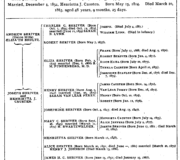THE SHRIVER FAMILY GREEN BOOK.
PART SECOND. NARRATIVES AND RECORDS TO THE PRESENT TIME. 1888.
(Page numbers from 1888 Green Book in [square brackets].)
![]()
Joseph Shriver
Civil Engineering | Bank Officer, Cumberland |
Children with their Connections | Genealogical Records
[98]
JOSEPH SHRIVER, the sixth and youngest son of Andrew Shriver, was born at Union Mills. He was baptized by the. Rev. Mr. Kopright; sponsors, his father and mother.
He was married to Henrietta Jane, daughter of James II. Causten, Esq., Washington, D.C. He was educated in Baltimore, choosing for his profession civil engineering. Having finished preparation, he, at the age of eighteen, entered upon duty as assistant to his brother James on the surveys of the projected western division of the Chesapeake and Ohio Canal. Afterward, in 1826, he was appointed by the famous engineer, Jonathan Knight, one of his corps of assistants in locating the National Road west of Wheeling, Va., and, upon the retiring of Mr. Knight (1828), he was commissioned by Government to succeed him, completing, within four years, the surveys of the road from Indianapolis to Jefferson City, Mo. Subsequently he was associated with Mr. Knight in the surveys for the location of the Baltimore and Ohio Railroad. He was also engaged, about this time, with his brother Thomas, in prospecting the route for the projected Philadelphia, Wilmington and Baltimore Railroad south of the Susquehanna.
In 1833 his uncle, David Shriver, enlisted his services in the re-establishment of the old “Cumberland Bank of Allegany,” which had failed. He was made cashier of the resuscitated bank and served in that capacity until 1852, when, at the death of David Shriver, he succeeded him as president of the bank. In 1864 the bank was merged into the First National Bank, with the same [99] officers, at which time Joseph Shriver subscribed for nearly one-half of the capital stock. The institution, by his conservative and judicious management, passed with credit through the financial crises of 1837, 1857 and 1873, and has always had the confidence of the public. In addition to the duties of bank officer, he was president, from its organization, 1854, of the Cumberland Gaslight Company; also, for some time, was an efficient director of the Baltimore and Ohio Railroad Company. In all these relations his course was that of a straightforward, honorable man of business; discharging the duties incumbent upon him with strict integrity of purpose, without fear or favor.
Politically, Joseph Shriver affiliated with the Whig and Republican parties; he never aspired to public office, taking interest in politics only as a citizen concerned for the weal of the commonwealth. During the Civil War he was an ardent supporter of the Union and Government. The 11th Indiana Regiment, while stationed at Cumberland, was indebted to him for substantial service. At a critical period he advanced $10,000, needed to pay the men of the regiment, relying simply upon the good faith of the Government to reimburse him. The regiment, ever after, held him in grateful remembrance, and made him an honorary member in recognition of their obligation and esteem. By many acts of timely generosity, he was regarded as one of the most charitable men in the community. His death, though occurring at the ripe age of four-score years, was deeply lamented by the citizens of Cumberland among whom he had resided the greater part of his life. The directors of the bank, at the time of his decease, placed on record, in a series of resolutions, their sense of the high regard had for him as an officer of the bank, citizen, friend and public benefactor.
HENRIETTA J. SHRIVER, wife of Joseph Shriver, was noted for her refinement, intelligence and gentleness of demeanor. Her love and devotion to her husband and children was a marked feature of her life; and site was much beloved by all her relatives and acquaintances. She was a member of the Episcopal Church, in [100] which faith she trained her children, of whom there were ten, viz., Charles Causten, Robert, Eliza, Henry, Josephine, Mary Carvallo, Henrietta, Alice, James H. C. and Josie.
CHARLES C. SHRIVER, the eldest son, was engaged in business at Cumberland until his death in the meridian of life. He married Sarah Brown Lynn. They had two children — both deceased. His widow married Stanley Cresap.
ROBERT SHRIVER, the second son, was an officer in the First National Bank. At his father’s death, 1886, he succeeded him as president of the bank, which responsible position he ably fills, in association with E. T. Shriver, the vice-president.
ELIZA SHRIVER married Dr. Stanley H. Fundenberg, at the time a resident of Cumberland.
HENRY SHRIVER is in the drug business, firm Shriver & Co., Cumberland. He married Sarah Van Lear Perry.
MARY C. SHRIVER married Harrison Swartzwelder, of Cumberland, where they reside.
HENRIETTA SHRIVER, with her brother Robert, maintains the old home, Cumberland.
ALICE SHRIVER married Col. Henry J. Johnson, of Cumberland. Col. Johnson was editor, also postmaster, for some years, at Cumberland. Both deceased.


